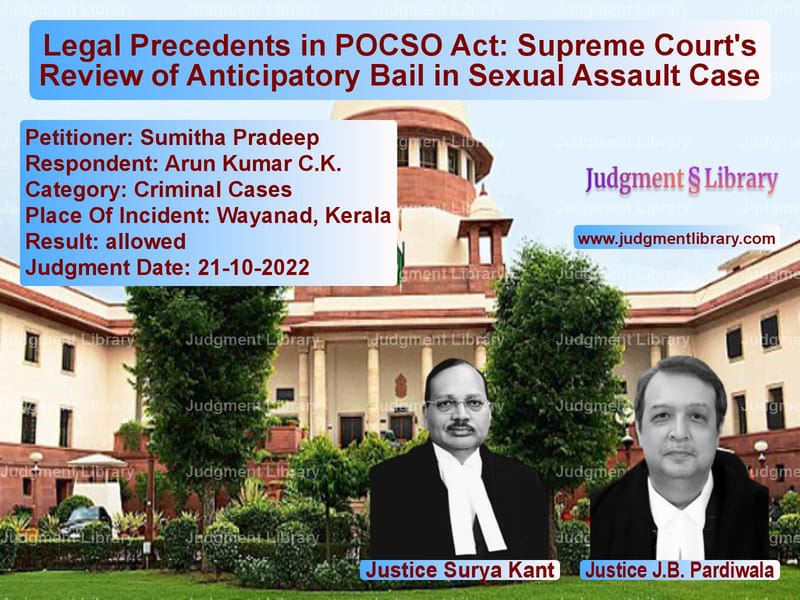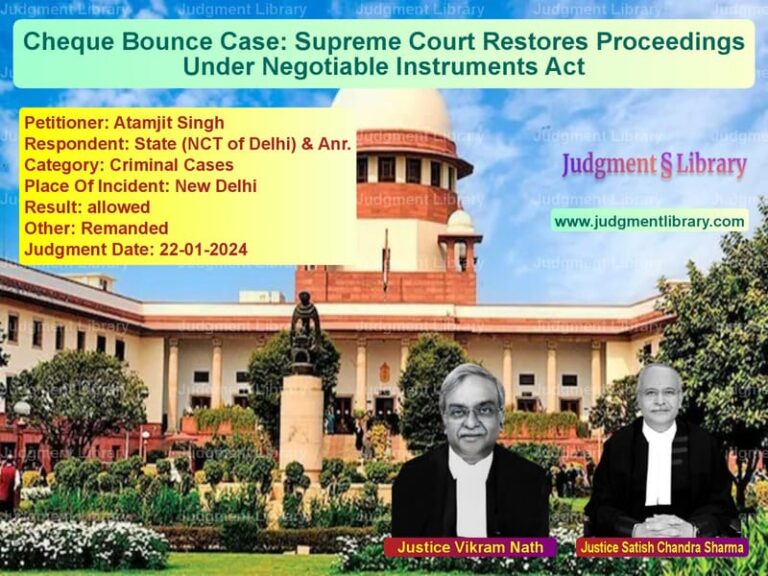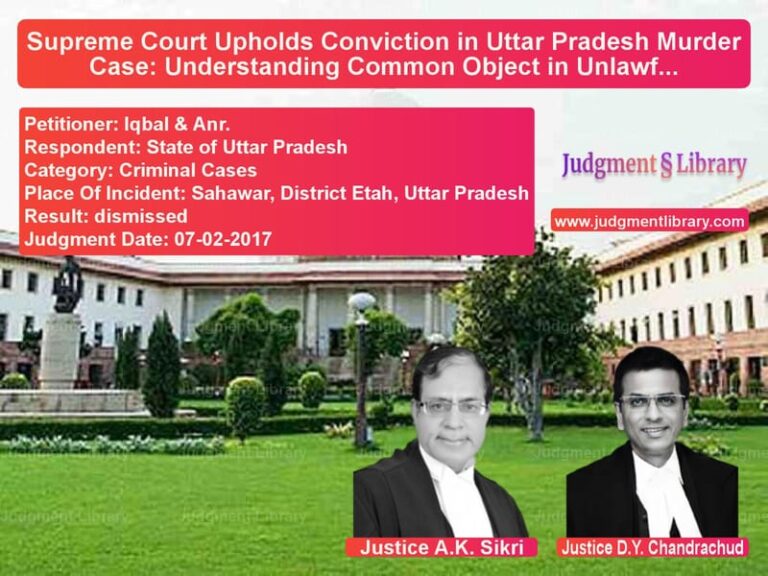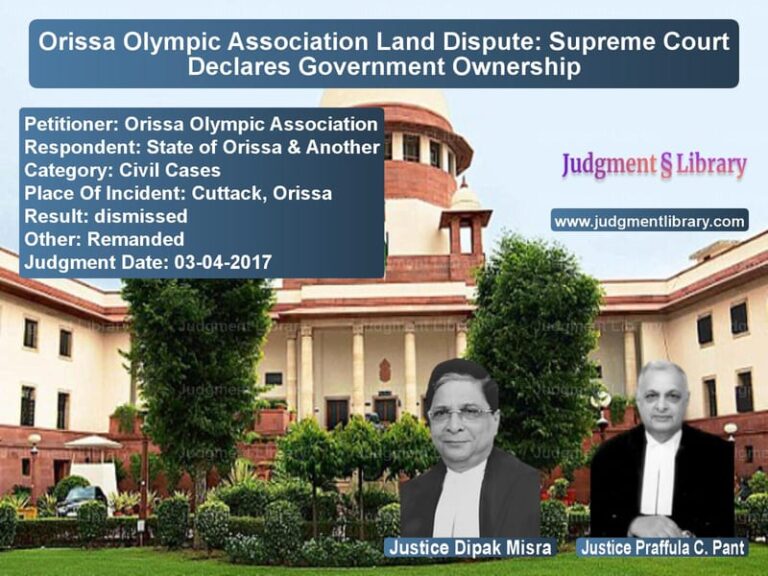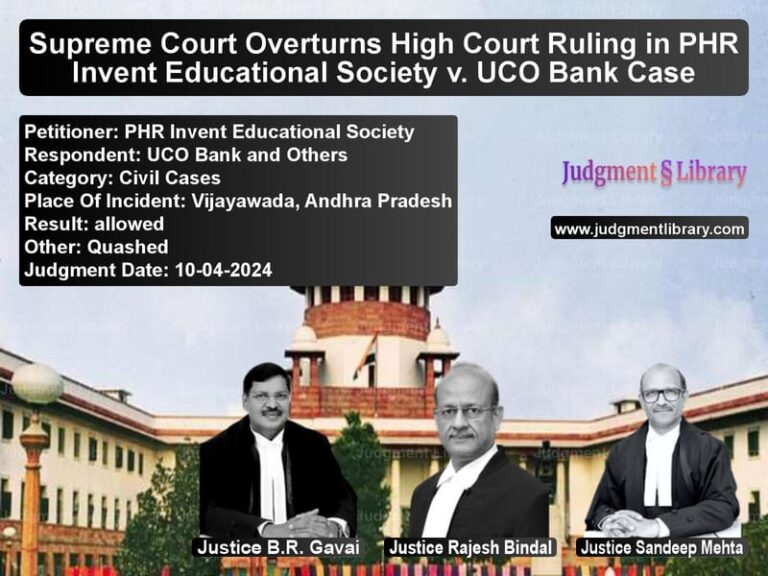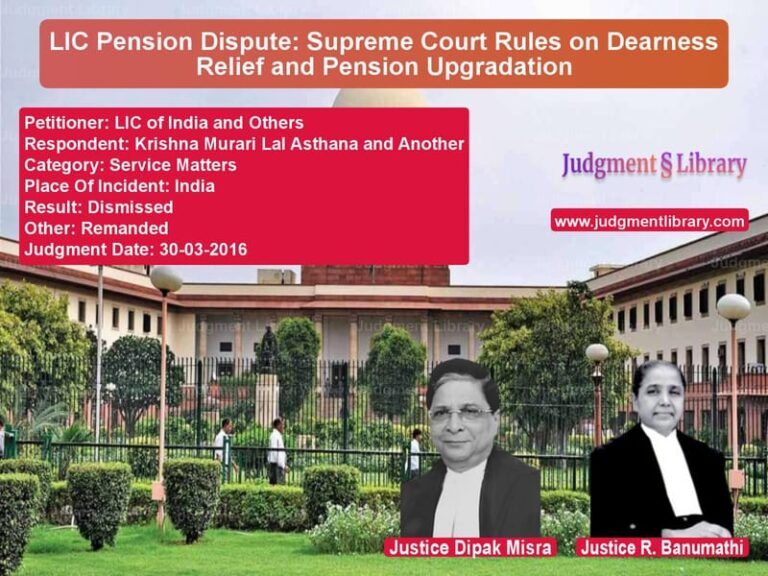Legal Precedents in POCSO Act: Supreme Court’s Review of Anticipatory Bail in Sexual Assault Case
The case under consideration involves a grave matter under the Protection of Children from Sexual Offences (POCSO) Act, 2012, regarding a 12-year-old girl and the anticipatory bail granted to the accused, Arun Kumar C.K. The petitioners in this case are the mother of the victim, Sumitha Pradeep, who is challenging the anticipatory bail granted by the Kerala High Court to the accused. The case revolves around the delicate issue of granting anticipatory bail in cases of sexual offenses, especially involving minors.
On December 14, 2021, the victim, a 12-year-old girl, was allegedly sexually assaulted by her maternal uncle, the respondent, Arun Kumar. The victim was reportedly asked to sit on his lap, hugged, kissed on the cheeks, and attempted to kiss on the lips. The accused also allegedly tried to disrobe the victim and made lewd sexual comments. The trauma caused by the incident had a severe impact on the victim’s academic performance. This eventually led to her disclosure of the abuse to her counselor, following which an FIR was lodged, and a medical examination was conducted.
The accused sought anticipatory bail from the Sessions Court, which was initially denied. He then moved the High Court, which, despite the severity of the allegations, granted anticipatory bail under certain conditions. The victim’s mother, the appellant in this case, approached the Supreme Court challenging the decision of the High Court, arguing that the anticipatory bail granted to the accused was a miscarriage of justice.
Arguments by the Petitioner and Respondent
The petitioner, Sumitha Pradeep, raised several concerns about the granting of anticipatory bail to the accused. The petitioner’s primary argument was that the nature of the crime—sexual assault of a minor—required stringent legal action, and anticipatory bail was not justified. The victim had suffered both physically and psychologically, and her academic performance had drastically declined due to the trauma. The petitioner also contended that the gravity of the offense demanded that the accused face immediate consequences for his actions, and anticipatory bail should not have been granted.
On the other hand, the respondent, Arun Kumar, argued that the delay in reporting the crime and the absence of custodial interrogation were grounds for granting anticipatory bail. The respondent further suggested that the case could have been influenced by ongoing property disputes between the parties and raised questions about the veracity of the allegations. He also argued that anticipatory bail should be granted because no custodial interrogation was necessary.
Court’s Review of the Case
The Supreme Court, upon reviewing the case, made several critical observations regarding the handling of anticipatory bail applications under the POCSO Act. The Court emphasized that in cases involving sexual assault on minors, particularly when the victim’s psychological and emotional state had been severely impacted, the decision to grant anticipatory bail must be taken with great caution. The victim’s performance in school and her mental state, as documented by the counselor, reflected the serious impact of the abuse. The Court acknowledged the sensitive nature of the allegations and noted that granting anticipatory bail in such cases could undermine the integrity of the investigation and the well-being of the victim.
The Court also pointed out the High Court’s failure to properly assess the seriousness of the offense, particularly the statements made in its judgment. In its order, the High Court suggested that the affectionate gestures made by the respondent, such as hugging and kissing, could potentially be interpreted as innocent. The Supreme Court found these comments unwarranted, as they overlooked the victim’s statement under Section 164 of the CrPC and the gravity of the sexual assault allegations. The Court emphasized that such comments undermined the severity of the allegations and the POCSO Act’s clear mandate to protect children from sexual exploitation.
Legal Precedents and Principles
In its ruling, the Supreme Court referred to the Kerala High Court’s decision in the case of Joy v. State of Kerala (2019), which discusses the application of Section 29 of the POCSO Act. This provision creates a statutory presumption of the accused’s guilt unless proven otherwise. The Court underscored the importance of considering this presumption when dealing with anticipatory bail applications in POCSO cases. However, the Court also clarified that while this presumption exists, it is not absolute, and courts must evaluate the facts carefully to ensure that justice is served.
The Court also addressed the issue of delay in reporting the crime, which the respondent argued should weaken the prosecution’s case. The Supreme Court reiterated the legal principle established in Joy v. State of Kerala that delay in reporting sexual assault, especially in cases involving minors, should not automatically discredit the prosecution’s case. In this case, the victim had been traumatized by the assault, which caused her to fall behind in her studies. The Court noted that this delay was understandable, given the emotional toll the crime had taken on the victim.
The Court’s Conclusion
After considering the arguments and reviewing the case, the Supreme Court concluded that the Kerala High Court had erred in granting anticipatory bail. The Court emphasized that anticipatory bail in such a serious case of child sexual abuse should not have been granted, especially when the victim had suffered severe emotional trauma. The Court also noted that the High Court had failed to fully appreciate the implications of Section 29 of the POCSO Act and the statutory presumption it creates.
The Court allowed the petition and set aside the High Court’s order granting anticipatory bail to the respondent. It reaffirmed that the well-being of the victim and the integrity of the investigation are paramount, and anticipatory bail should not be granted where there is a prima facie case of serious criminal offenses against the accused. The Court further held that the Investigating Officer should be allowed to proceed with the investigation without interference and that law should take its course.
Outcome and Implications
The Supreme Court’s ruling sends a strong message about the importance of protecting the rights of minors and upholding the provisions of the POCSO Act. The Court’s decision reflects its commitment to ensuring that children are protected from sexual exploitation and that the law is applied effectively to safeguard their well-being. The judgment also reinforces the need for careful consideration of anticipatory bail applications, particularly in cases involving serious allegations of sexual assault, and underscores the critical role of the judiciary in ensuring that justice is served.
Petitioner Name: Sumitha Pradeep.Respondent Name: Arun Kumar C.K..Judgment By: Justice Surya Kant, Justice J.B. Pardiwala.Place Of Incident: Wayanad, Kerala.Judgment Date: 21-10-2022.
Don’t miss out on the full details! Download the complete judgment in PDF format below and gain valuable insights instantly!
Download Judgment: sumitha-pradeep-vs-arun-kumar-c.k.-supreme-court-of-india-judgment-dated-21-10-2022.pdf
Directly Download Judgment: Directly download this Judgment
See all petitions in Bail and Anticipatory Bail
See all petitions in Juvenile Justice
See all petitions in Judgment by Surya Kant
See all petitions in Judgment by J.B. Pardiwala
See all petitions in allowed
See all petitions in supreme court of India judgments October 2022
See all petitions in 2022 judgments
See all posts in Criminal Cases Category
See all allowed petitions in Criminal Cases Category
See all Dismissed petitions in Criminal Cases Category
See all partially allowed petitions in Criminal Cases Category

